I got married last year and once my now wife and I made the decision to get hitched, it was clear that any engagement or wedding rings had to be ethical. After all, if you’re choosing to get married, it’s always a good idea to start out conflict-free.
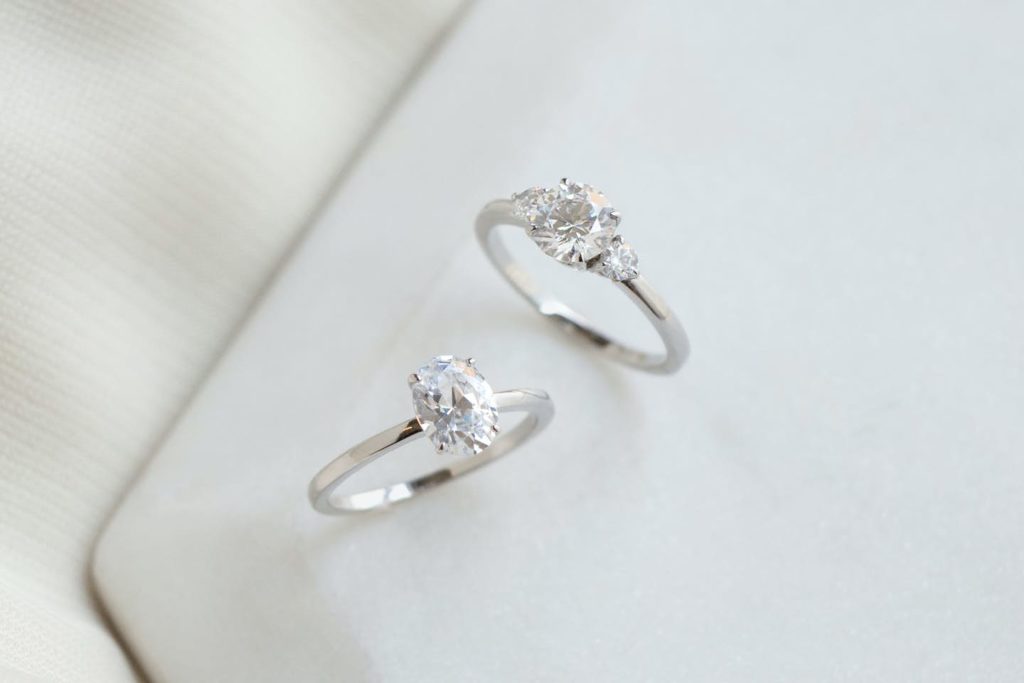
In the early 1990’s civil war broke out in Sierra Leone. Thousands of people died over the next decade and a considerable amount of the money that went into funding armed factions within the country came from the sale of diamonds.
After the war ended, the diamond industry was called upon to acknowledge the role of these rare gems in funding the conflict, leading to the adoption of the term ‘conflict diamond’ or ‘blood diamonds’. In short, conflict diamonds are rough diamonds sold to finance wars against governments. This definition, as laid out in the Kimberley Process specifically restricts the term to mean diamonds that finance rebel movements against recognized governments.
The success of the United Nation’s Kimberley Process
The Kimberley Process is a certification scheme established by the United Nations General Assembly in 2003 with the intention of preventing conflict diamonds from entering the mainstream rough diamond market. This scheme tracks the imports and exports of diamonds from countries worldwide and works with governments, industry, and communities to limit the reach of conflict diamonds into the world market.
If you ask a diamond company or jeweler for source certification, they should be able to tell you which country and which mine your diamond came from. If they can’t, you have no way of knowing if this is a conflict diamond that has sustained violence in Angola, the Ivory Coast, the Democratic Republic of Congo, Liberia, Zimbabwe, or elsewhere.
Since being set up in 2003, the Kimberley Process has come to represent most nations involved in the diamond trade and is estimated to have successfully reduced the conflict diamond trade to less than 1% of the global diamond industry. The process has inarguably helped keep money out of the hands of those who would use it to commit human rights atrocities.
Potential loopholes in the Kimberley Process
Still, the Kimberley Process is not perfect and has some significant loopholes and some countries had declined to join the process at all. Conflict diamonds continue to enter the supply chain even from countries who are signed up. This is because of a lack of consistent independent monitoring of the member countries’ national control systems and, in part, the fact that diamond certificates are paper-based, making them vulnerable to loss, forgery, and tampering.
This has led some jewelers to go beyond the Kimberley Process to source diamonds that are in no way linked to any form of violence, human rights abuses, impoverishment of communities, or environmental destruction and that come from sources with safe and responsible labor practices. For some, such as MiaDonna, this includes acknowledging that Canadian diamonds and other diamonds certified by the Kimberley Process often have a significant negative impact on the environment, including harming local wildlife, waterways, and indigenous peoples – hardly conflict-free.
The importance of transparent mining laws
- Companies such as Bario Neal take the approach of strictly sourcing diamonds and gemstones from countries with robust mining and extraction laws in place, in their case Namibia, Canada, and Australia.
- The mines in Namibia are certified according to the ISO 14001 standard, or the International Organization for Standardizations system for environmental management. Australia has laws in place mandating strict adherence by diamond and precious metal mining companies to environmental and labor practices.
- The mining and production of all Canadian diamonds is subject to the strict standards set by the Canadian Diamond Code of Conduct and the government of the Northwest Territories, designed to protect the Arctic environment, mine workers, and surrounding communities. Canadian diamond mines are monitored by independent organizations that are partnerships of the local and federal governments, the mine, and neighboring communities, the majority of which are Aboriginal groups.
- Taking this approach, rather than switching entirely to lab-grown or vintage diamonds, avoids the risk of removing economic opportunities in traditional artisanal mining communities. The middle-ground, perhaps, is in buying diamonds from a company such as MiaDonna, who offer financial support to such communities to create alternative economic opportunities.
The future of sustainable diamond certifications
It’s also possible that an alternative to the Kimberley Process, namely a Fair Trade diamond certification system, may be developed in the future, largely thanks to Brilliant Earth. Beth Gerstein, cofounder of Brilliant Earth, has publicly committed to offering Beyond Conflict Free Diamonds™ that have ethical and environmentally responsible origins. The company places a strong emphasis on the social impact of mining and donates five percent of net profits to support a brighter future in artisanal, small-scale mining communities.
And there are even some moves to use blockchain technology to better track diamonds through the supply chain.
Alternatives to Conflict Diamonds
The obvious alternative to conflict diamonds is… conflict-free diamonds but, as discusses, there remain some questions over claims to be conflict-free. Thankfully, there are other choices, including recycled and lab-grown diamonds.
Recycled diamonds are diamonds that are repurposed from a previous setting or that were bought but never set. Because recycled diamonds require no new mining, they are a more responsible choice all round. These diamonds are typically graded by gemologists, so they can be compared to newly mined diamonds and lab-grown diamonds.
As the name suggests, lab-grown diamonds are created in a laboratory. Scientists figured out how to recreate the conditions that lead to natural diamond development underground. This means that lab diamonds have the same physical, chemical, and optical characteristics as natural diamonds, with the advantages of costing less and avoiding concerns over diamond mining. With a lab-grown diamond you’re likely to get about 30 percent more diamond for the same price as a traditional ‘earth-grown’ gem.
Other things to consider when shopping for a sustainable diamond
In addition to considering a ring made with lab-grown or recycled diamonds, here are a few other things to think about when buying an ethical engagement or wedding ring include:
- Choosing a ring made with recycled or Fairmined certified gold
- Finding a vintage ring from consignment jewelry stores or online auctioneers
- Working with a jeweler to repurpose jewelry you already own
- Choosing a non-traditional ring, such as a wooden ring
What is Fairmined gold? Glad you asked. Fairmined is a certification that guarantees the gold in your ring (or other piece of jewelry) is fully traceable from mine to market and comes from an environmentally and socially responsible mining operation. This typically means artisanal and small-scale mines that support communities. The Fairmined Initiative was created by the Alliance for Responsible Mining (ARM), a non-profit organization and leader of responsible artisanal and small-scale mining. Fairmined was set up to enable metal mining communities to access fair pay and to encourage environmentally conscious mining practices.
No dirty gold
No Dirty Gold is another campaign intended to clean up the gold industry. Gold mining is a highly destructive and polluting practice that can displace communities, contaminate drinking water, and hurt people and planet. No Dirty Gold estimates that producing enough gold for a single wedding ring can generate 20 tons of waste. This campaign promotes alternatives to gold mining, such as supporting the efficient use, recycling, and repurposing of existing mineral supplies. Current signatories to No Dirty Gold include James Allen, Catbird, and Bario Neal.
Our top picks
Curious about how we rate products? Click here to view our methodology, which at its core, is about voting with our dollars to fight climate change.
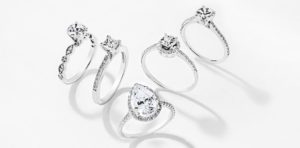
MiaDonna
Highlights: Going well beyond conflict-free, MiaDonna use exclusively lab-created diamonds and recycled metals and contribute financially and in other ways to rebuilding communities ravaged by mining.
MiaDonna is based in Portland, Oregon, and use exclusively lab-created diamonds and recycled metals to create their stunning and sustainable diamond rings and other jewelry. MiaDonna’s ring settings are handcrafted using recycled solid gold, 950 pure platinum, or 950 pure palladium from environmentally friendly refineries.
A certified B Corp since September 2019, MiaDonna goes beyond the idea of conflict-free diamonds. They note that many diamonds certified conflict-free by the Kimberley Process are still mired in conflict. MiaDonna also consider the humanitarian and environmental costs of traditional diamond mining and consider a conflict diamond to be “any diamond that is unsustainable, thereby contributing to a negative impact on the environment, society and/or economy.
MiaDonna consider that conflict diamonds don’t just originate in Africa; these diamonds can also come from Brazil, Russia, and India, as well as Canada. Their stance is that the Kimberley Process has failed and is merely a band-aid offering faux reassurance to consumers, being that there is “no such thing as a ‘conflict free’ earth mined diamond.”
MiaDonna’s mission, then, is to “offer consumers beautiful, ethical and affordable fine lab-grown diamond jewelry that would help free innocent children oppressed by the active conflict diamond mining industry.” The company donates 10% of net profits to fund educational, mentorship, agricultural, and urgent relief programs in diamond mining communities through their foundation, The Greener Diamond. They also plant a tree with every order through One Tree Planted to offset the carbon emissions created through shipping.
As a social enterprise, MiaDonna isn’t beholden to shareholders, board members, mining companies, or corporations. Instead, the company’s goal is to create ethical jewelry that helps improve the quality of life for people in sub-Saharan Africa. In addition to the 10% donation, they also donate time to ensure that The Greener Diamond runs with no administrative costs. This charitable initiatives currently sponsors agricultural farms in Liberia and Sierra Leone where reformed child soldiers are trained to grow food, instead of mining for diamonds.
MiaDonna has also been awarded the Green America Seal of Approval for environmental sustainability and social justice, and they offer carbon neutral shipping. This is done by investing in reforestation projects through One Tree Planted. What’s more, they offer their own non-toxic jewelry cleaner for free in a fully recyclable container with all domestic orders.
Oh, and they’ve installed a super efficient water filtration system to recycle the water used in creating their jewelry. Jewelry-making is a water intensive business, so this helps conserve drinking water for, well, drinking.
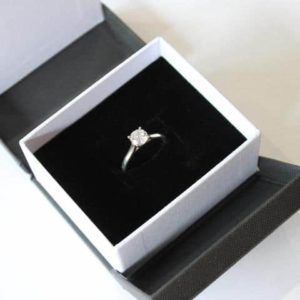
Fair Trade Jewellery Co. (FTJCo.)
Highlights: A fantastic B Corporation, using Fairmined, Fair Trade, nickel-free gold to make beautiful engagement and wedding rings, with a proposal loaner ring program.
Fair Trade Jewellery Co. is a Canada-based online jeweler that was founded with the vision of providing consumers with a genuine option for responsible and ethical jewelry. FTJCo. became a B Corp in 2013, was the first North American business to use Fair Trade Certified gold, the second jeweler in the world to use Fairmined gold, and has strong partnerships with the Responsible Jewellery Council, the North American Gem Association, and the Competition Bureau of Canada.
The company has a current B Corp score of 106.8 (which is high!) and has shown consistent improvement in this score, demonstrating that the company isn’t resting on its laurels when it comes to labor rights, environmental initiatives, governance, and community support. Indeed, FTJCo. has been working with Canadian NGO, IMPACT, to engage in and support responsible sourcing and legal trade in conflict-free ASM gold from conflict-affected regions.
In early 2018, FTJCo. adopted a conflict minerals policy which will be shared with all future suppliers and business partners. The company acknowledges that it is a downstream actor in the jewelry supply chain, but is “committed to engaging with all actors in the supply chain down to the mine site level in order to ensure proper due diligence is carried out.” Their due diligence and risk assessments go beyond the point of refining, and they work closely with partners in the field or via well-established programs for responsible sourcing, such as Fairtrade and Fairmined. This includes working with suppliers to institute chain of custody and OECD compliance for all the materials they use.
FTJCo. doesn’t just pay lip service to these responsibilities. In fact, they’re outspoken about how assurances and warranties of conflict-free status are often given too much weight in the jewelry industry and are working to introduce more rigor to such claims. As part of this process, they publish their auditor’s report on their website for all to see. The latest report highlights IMPACT’s Just Gold project: After a pilot phase, in May 2017, IMPACT announced the Just Gold project had proven a legal, traceable, and conflict-free chain of custody from mine site to exporter—a first for artisanal gold in Democratic Republic of Congo.
In June 2018, FTJCo. began offering a ‘house blend’ of 50% Just Gold with 50% recycled gold. They also offer Fairtrade and Fairmined gold.
One other cool thing about FTJCo. is that the company offers ‘loaner rings’ made of silver and cubic zirconia, so you can propose with a beautiful ring safe in the knowledge that it can be returned and exchanged for a ring of your soon to be spouse’s choosing.

Vrai
Highlights: Vrai make beautiful jewelry with recycled gold and the world’s first certified Carbon Neutral® lab-grown diamonds, make with hydropower!
Vrai means ‘truth’ in French and ‘gold’ in Spanish, which is a pretty good combination in any language. As a company, Vrai use exclusively lab-created diamonds from their parent company, the Diamond Foundry, which is also based in the USA. These diamonds are sustainably created and are the first certified zero carbon footprint diamonds produced using hydropower from Washington State’s Columbia River. This Carbon Neutral® certification (from Natural Capital Partners) covers the diamonds from forging to polishing to shipping, and even accounts for the Diamond Foundry’s employees commuting to and from work!
As a direct to consumer jewelry company, Vrai offer amazing value for money, with quality diamond engagement rings without the markups. Their collection includes pieces with white diamonds, black diamonds, a variety of stone sizes and shapes, and stacking rings too. Designs tend to be cleaner and simpler than from many other jewelers, making them a great choice if you’re going for something understated where the diamond can really shine.
Every diamond in the collection is certified with a unique gemological ID and backed by a lifetime guarantee. Diamond Foundry estimates that for every carat, their lab-grown diamonds save 250 tons of earth removed to mine a carat of diamond, 120 gallons of water, and 143 lbs of carbon dioxide.
For their in-house gold jewelry, Vrai only use recycled gold sourced from RJC certified suppliers. Every ring is made by hand to order and orders over $1500 require a signature upon delivery, as do wedding collection orders and made-to-order designs.
Vrai also has a charitable side to the business, including, most recently, auctioning off jewelry to raise funds for frontline healthcare workers.
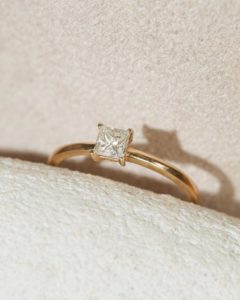
AUrate New York
Highlights: Founded in 2015, AUrate New York specialize in minimalist wedding bands and engagement rings made with traceable diamonds and recycled gold, with jewelry available for as little as $50!
AUrate NY go beyond the Kimberley Process and source diamonds using a higher standard of ethics that takes into account environmental impact. One of the more affordable ethical jewelry brands, AUrate are based in New York where they also donate to support literacy programs (for every piece purchased, they donate a book in your name!). AUrate’s co-founder and designer, Sophie Kahn, is inspired by NYC, creating rings modeled on the arches of the Brooklyn Bridge, and other jewelry that reflects the vibrancy and architecture of the city she loves.
AUrate was founded by longtime friends Sophie Kahn and Bouchra Ezzahraoui after Kahn got the dreaded ‘green finger’ when wearing a ring that was supposedly pure gold. This appreciation of genuine gold means that every AUrate piece is designed and handmade using ethically sourced and sustainably made 100% recycled gold. This includes 14K gold, 18k gold, and 14k gold-plated vermeil, with the latter coated with 2.5 microns of 14K gold (instead of the industry standard 1.5 microns and 10K gold). There’s absolutely no nickel in their jewelry.
AUrate use large pearls harvested from the South Sea with a high-quality AAA-grade, and source smaller Akoya pearls from Japan. These pearls are sustainably farmed and sensitively harvested to protect marine ecology. Indeed, the company is committed to only using raw materials that are certifiably conflict-free and sustainably sourced.
AUrate offer a 30-day refund, including for made-to-order pieces, with the exception of engraved pieces. This includes free return shipping. (They aren’t currently processing returns and have extended the return window accordingly due to COVID-19.)

Catbird
Highlights: Woman-owned and operated, Catbird offer designer rings at an affordable price made in NYC with recycled, conflict-free, or lab-grown diamonds and fair trade or recycled gold.
Catbird is a Brooklyn-based jewelry company that’s been around since 2004 and makes beautiful, unique, handmade pieces using fair trade and recycled gold and conflict-free diamonds, recycled diamonds, and lab-grown diamonds.
All of the brilliant cut diamonds in the Catbird collection are recycled, while the rose cuts are conflict-free, sourced from longstanding suppliers that go above and beyond the Kimberley Process standards. Catbird also ensure that cutting facilities are safe and audited by a third-party on an ongoing basis.
Starting at much lower prices than many of the companies on this list (but rising to around $14k!), Catbird is a great choice if you want an ethical, sustainable diamond ring or other jewelry at any price point. All of Catbird’s wedding rings come in gold and almost all in platinum. The company pays special attention to durability, noting that more active folks might want to choose platinum over a softer 22 carat gold, so your ring will keep its shine and be less liable to get scratched up.
A whole host of designers work with Catbird to create magical pieces from vintage diamonds removed from other pieces of jewelry. This means the stones have no environmental impact and get a second chance at life.
All of the jewelry is made in New York and Catbird even has a tiny store and a Wedding Annex devoted to engagement and wedding rings. Catbird is a woman owned and operated business that offers generous employee benefits and a safe, light-filled, clean working environment (in contrast to many jewelry workshops). Because their studio, shipping warehouse, and office are all in the same place, the vertical integration allows for a lower carbon footprint, faster work, better quality, and more affordable prices.
The company sources all of their gold chain, wire, findings and castings from vendors who are committed to minimizing the environmental impact of their work. They use a New York City caster who is a leader in using all recycled metals and clean, electric equipment. Catbird is a certified member of No Dirty Gold, an international campaign to clean up the industry. They also make sure to source pearls from a third-generation farm in Hubei Province in China, where clean water practices are used. They also use a small selection of gemstones sourced from mines with ‘the highest environmental and human rights standards.’
Their order form includes a Special Instructions section where they encourage you to specify if you’d like minimum packaging or have other requests. Catbird has also long been a charitable company, with their own 501c3 foundation, the Catbird Giving Fund. Through this fund, Catbird donates at least 1% of all sales (not profit or “proceeds”) year-round to non-profits – amounting to more than half a million dollars so far.

Trumpet & Horn
Highlights: Eco-friendly and one of a kind, Trumpet & Horn rings are made with recycled metals and repurposed diamonds and are affordable too!
If you’re looking for a vintage-style engagement ring or other jewelry, check out Trumpet & Horn. With free US shipping and starting at $325 (and rising to over $40k!), these pieces are a beautiful and affordable option made with recycled metals, repurposed jewelry, and antique diamonds.
Trumpet & Horn adhere to the American Gem Trade Association’s Code of Ethics, and support the Kimberley Process, and specialize in ethically sourced, vintage engagement rings and genuine antique rings (where the ring is over 100 years’ old). Vintage rings are those made within the last 100 years but are at least 20-30 years old. The company also offers ‘vintage inspired’ rings, which are those that are newly made, not previously owned, but that were designed to look vintage or antique. While some companies make vintage inspired rings using metals and gems of dubious ethical merit, Trumpet & horn only use antique or vintage cut diamonds and recycled metals to create new settings. Trumpet & Horn are specialists in salvaging what can be salvaged from older pieces of jewelry, including watches, brooches, earrings, and so forth. They then repurpose stones and melt down the gold in Los Angeles metals to make new jewelry that maintains that vintage vibe.

Bario Neal
Highlights: One-of-a-kind diamond rings and other jewelry made with recycled and ethically sourced stones and metals by a company that advocates for and financially supports sustainability, environmental responsibility, and marriage equality. They’ll also re-set your family heirloom diamonds!
Bario Neal is a Philadelphia-based jeweler making one-of-a-kind engagement rings using recycled diamonds, diamonds sourced from ‘conflict-free’ regions such as Canada, Namibia, and Australia and fair trade gold. Unlike most jewelers, Bario Neal can re-set heirloom diamonds (i.e. diamonds that have been in your family for years), giving you a chance to create meaningful jewelry at a much lower cost than buying new diamonds.
The company is also signed up to No Dirty Gold, are proponents (and financial supporters) of marriage equality and environmental sustainability and offer excellent customization options to really make a ring your own.
Bario Neal was founded by designers Anna Bario and Page Neal, who were disillusioned by the low standards of the jewelry industry, in terms of value and ethics. The company promotes ethical sourcing, progressive manufacturing, and firmly believes in the right to love and marry whomever and however you choose, with advocacy for human rights within the jewelry industry a ‘non-negotiable part of our mission.’
Bario Neal was one of the first jewelry companies to sign up for the Fairmined Assurance label and works with carefully selected US refineries to minimize environmental impact while produced recycled metals. Their jewelry is made with 100% reclaimed silver, gold, palladium, and platinum or Fairmined gold. Some of their materials, such as some chains and earring posts and backs, are not yet available in 100% recycled or Fairmined metals, but they’re working to source these responsibly.
They also hold themselves to higher standards for ethical and sustainable gemstone sourcing and have led the way in sourcing custom-cut ethical origin baguette diamonds and traceable pave diamonds and colored gemstones. They primarily use recycled diamonds but also source some as ethically as possible from Australia, Canada, and Namibia. Bario Neal also offer assurances beyond the source of the diamonds, noting that some of the harshest labor practices exist in the cutting and polishing of gemstones.
The recycled diamonds that Bario Neal use in their designs are all professionally cleaned. Those larger than .35 carats come with a Gemological Institute of America certificate. They’ll also get heirloom diamonds appraised for insurance purposes, if they’re over a quarter carat.
Bario Neal also work with raw diamonds and melee diamonds, which isn’t all that common in the jewelry industry (in part because melee diamonds are hard to source ethically) but gives you more options to keep costs low and create the aesthetic you want. The company only uses recycled or newly mined melee diamonds that are fully traceable, from Australia or Canada. The same goes for their black diamonds which, again, are not typically ethically sourced because of cost. Bario Neal only work with recycled or ethically sourced black diamonds, from three mines in Brazil, Canada, and Australia. They’re also very transparent about the sources of their gemstones, including sapphires, emeralds, jade, opals, and rubies.
The company strives to be low-impact environmentally in their Philadelphia studio and supports fellow artisans on the city’s historic Jewelers’ Row. The owners of Bario Neal are founding members of the Ethical Metalsmiths Jewelers Directory and the Ethical Sourcing Consortium. All jewelry comes with a one-year warranty, covering manufacturing defects, and all jewelry is shipped in eco-friendly jewelry boxes made with recycled paper by a small-scale manufacturer in North Carolina. Even their other packaging materials are made in the USA and their printed materials use recycled paper stock. They also offer porcelain jewelry boxes hand cast in Portland, Oregon.
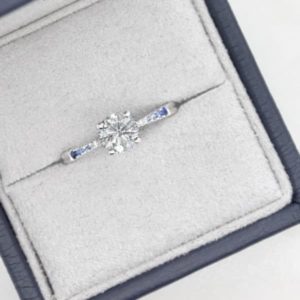
Taylor & Hart
Highlights: A more traditional jewelry company, Taylor & Hart make custom rings to order using ‘conflict-free’ diamonds and the option of fairmined metals.
Every Taylor & Hart ring is made to order, with a typical turnaround time of around four weeks. This involves design work in London, UK, production in China, and setting, polishing, and engraving back in London. Taylor & Hart also manufacture rings for some ‘famous’ brands, whose names they don’t reveal. They use standard metals, but also offer fair trade gold and recycled gold and platinum engagement rings upon request. Their diamonds include CanadaMark diamonds and those certified by the Kimberley Process.
Taylor & Hart’s CEO, Nikolay, grew up in Africa, including in South Africa and Zimbabwe. This has helped inform the company’s decision to try not to purchase Zimbabwean diamonds, which remain problematic even though these are now deemed Kimberley Process compliant. Taylor & Hart use the Kimberley Process as a benchmark but are more discerning in their sourcing.
This company is also partnered with Everledger, who also invest in Taylor & Hart. Everledger is one of the organizations trying to transform diamond tracking by using blockchain technology.
Taylor & Hart offer a lifetime warranty on manufacturing defects, 90-day returns, free and insured shipping, and they deliver your ring in a faux leather presentation box in packaging free from branding (so as not to ruin the surprise!). Custom design services start from $1500, with a handful of existing inventory at just under $1000.

James Allen
Highlights: James Allen offers designer engagement and wedding rings using Kimberley Process certified conflict-free diamonds, plus they offer free inscriptions.
James Allen is a well-known name in the jewelry business and offer designer engagement and wedding rings using Kimberley Process certified conflict-free diamonds. The company is signed on to No Dirty Gold and has been around since 2006. James Allen is the largest privately held online diamond retailer worldwide. Their current collection includes an astonishing 200,000 conflict-free diamonds and they offer a wide range of settings.
What really sets James Allen apart is their 360-degree HD online showroom. This allows you to view all ring settings and diamonds in highly magnified form on your device or computer. Thanks to this technology, diamond suppliers flock to James Allen, hence the giant inventory. They way they work is that you pick your setting and then pick your diamond. Or, if you already have a diamond, they’ll set the diamond in your setting of choice.
James Allen offer free inscriptions and, unlike most other jewelers, accept engraved rings under their return policy (with a $25 re-polishing fee).
Prices start at $180 for settings only and all rings have a lifetime warranty and a 100% money back guarantee, with James Allen offering unparalleled 24/7 customer service. Their lifetime warranty also includes free prong tightening, re-polishing, rhodium plating and cleaning services. They’ll resize your ring once for free in the first year of purchase and offer free return shipping in the US and Canada for the first resize.

Noémie
Highlights: Noémie use recycled 18K gold and Kimberley Process certified conflict-free diamonds, plus they offer a custom design process and a lifetime warranty.
Noémie use recycled 18K gold and Kimberley Process certified conflict-free diamonds or lab-grown diamonds to create beautiful jewelry that they showcase by appointment in their SoHo loft. They offer free overnight shipping and returns for online orders, a custom design process, a lifetime warranty, and IGI certification for their diamonds. Prices start at around $3,000.
Just wondering how the Instagram famous Brilliant Earth ranked on conflict free jewelry based off of your research?
Hi Kirsten,
Good find!
Brilliant Earth look to have a solid sourcing policy that goes beyond the Kimberley Process. They also offer recycled and lab-grown diamonds, which are arguably even better in terms of human and environmental ethics. And they use recycled gold and other precious metals in some of their jewelry, so seem like a great choice for an ethical conflict-free diamond ring. Thanks for bringing them to my attention. I’ll do a deeper dive and likely add them here when time allows.
Thanks,
Leigh